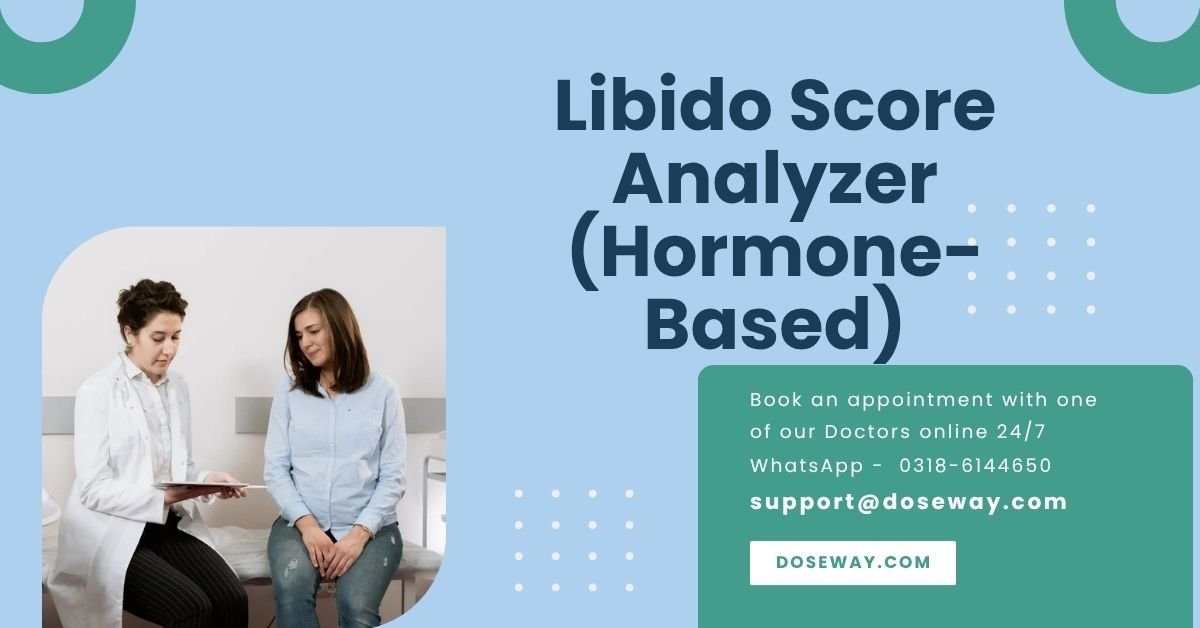Libido Score Analyzer (Hormone-Based)
Your Libido Score
Interpretation
Personalized Recommendations
Libido Score Report
Generated by DoseWay Libido Score Analyzer
Personal Information
Medical History
Libido Assessment
Results
Recommendations
Try More Free Tools:
- Try our Birth Control Effectiveness Calculator
- Try our Erectile Dysfunction Risk Calculator (ED Estimator – IIEF-5)
- Try our Fertility Calculator By Age
Libido Score Analyzer (Hormone-Based)

Table Of Contents
Understanding Hormonal Libido
Sexual health is a critical component of overall well-being, and libido (sexual drive) plays a central role. Hormonal imbalances, lifestyle factors, and medical conditions can significantly impact libido. Our Free Libido Score Calculator provides a hormone-based assessment to help you understand your sexual health. Let’s explore the science behind libido, key hormones involved, and how our tool works.
What Is Hormonal Libido?
Libido refers to a person’s overall sexual drive, influenced by biological, psychological, and social factors. Hormones like testosterone, estrogen, prolactin, and cortisol act as chemical messengers regulating sexual desire. Even minor imbalances can lead to:
- Reduced interest in intimacy
- Erectile dysfunction (in men)
- Vaginal dryness (in women)
- Fatigue and mood swings
Key Parameters Analyzed by the Libido Score Calculator
Our tool evaluates both hormonal and lifestyle factors:
1. Hormonal Markers
| Hormone | Role in Libido | Normal Range |
|---|---|---|
| Testosterone | Drives sexual desire (both genders) | Men: 300–1,000 ng/dL Women: 15–70 ng/dL |
| Estrogen | Maintains vaginal health | Women: 30–400 pg/mL |
| Prolactin | High levels reduce libido | <20 ng/mL |
| Cortisol | Chronic stress disrupts balance | 10–20 mcg/dL AM |
2. Lifestyle Factors
- Sleep quality (hours/night)
- Stress levels (1–10 scale)
- Relationship satisfaction
- Physical activity frequency
How the Calculator Works
Step 1: Input Demographics & Health Data
Users provide:
- Age and gender (for hormone reference ranges)
- Hormone levels (with unit conversion for global users)
- Lifestyle metrics via sliders and checkboxes
Step 2: Algorithmic Analysis
The tool calculates a Libido Score (0–100) using weighted values:
- Hormones (60%): Testosterone, estrogen, prolactin
- Lifestyle (30%): Stress, sleep, exercise
- Psychological (10%): Relationship satisfaction
Step 3: Results & Interpretation
- Score Ranges:
- 70–100 (Green): Optimal libido
- 40–69 (Yellow): Moderate concerns
- 0–39 (Red): High risk of dysfunction
- Personalized Recommendations:
- Hormone testing advice
- Stress management techniques
- Sleep hygiene tips
Why Use This Tool?
- Clinical Accuracy: Based on peer-reviewed hormone thresholds.
- Privacy-First: No data stored or shared.
- Actionable Insights: PDF report with lab-ready metrics.
FAQs
Can hormonal birth control affect my libido score?
Yes. Estrogen-based contraceptives may lower free testosterone.
How often should I retake the assessment?
Every 3–6 months, or after significant lifestyle/hormonal changes.
Is this tool a substitute for medical advice?
No. Always consult a healthcare provider for diagnosis.

 Cart is empty
Cart is empty
Add a Comment